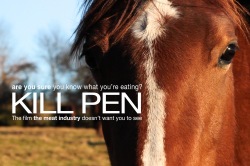
At the end of last month, the Federal Court in Vancouver heard a ground-breaking case about the way the CFIA, an agency of the Canadian Federal Government, has failed to protect animals.
The Canadian Horse Defence Coalition (CHDC), a non-profit organization that has for years been documenting the live exports of horses overseas by air cargo for the purpose of slaughter, had noted repeated violations of two Sections of the Health of Animals Regulations (HAR). Specifically, these protective statutes are in place to prevent horses taller than 14 hands high (56” to the top of the shoulders) from being crated together, and to allow for sufficient headroom for the confined animals. Video and photographic evidence compiled since 2012 revealed up to four horses crated together for shipping, and ears occasionally in contact with the tops of the crates. These ongoing breaches of law have caused injuries and prompted the coalition to seek legal guidance from animal law lawyer, Rebeka Breder, of Breder Law.
There is a reason why Rebeka was voted the top 25 Most Influential Lawyer in Canada by Canadian Lawyer Magazine, and won the “Changemakers” category.
Rebeka radiates the very power that initiates change. To see her in action in the courtroom is to realize that a small organization’s voice can be heard and that our goals may truly be possible to achieve, no matter how daunting it is to challenge an entity as formidable as the federal government.
Rebeka hauled four large storage boxes full of files into the courtroom. Justice Boswell even commented on the “voluminous” amount of material that had been placed before him to peruse. But make no mistake: while the physical presence of those files was impressive, nothing could compete with Rebeka’s ability to build a compelling case out of what she had compiled and studied over the course of the last couple years. The facts were at her fingertips, and the delivery of her verbal argument was nothing short of brilliant.
Day One in the courtroom saw Rebeka challenging the Minister’s submission aimed at striking important CHDC evidence, and the Minister’s attempts to render our case “moot” because of pending changes to the transport regulations, effective February 2020. It had been asserted by the Minister that material such as Access-to-Information files were “not before the decision-maker” when the CFIA’s IPPOG (Interim Program Policy and Operational Guidance) was implemented in August 2017, and therefore should be struck. Rebeka pointed out that the ATIP files had been obtained from the agency itself and were in fact available to the decision-maker. She stressed that the CHDC “is challenging an unlawful course of conduct under the Federal Courts Act, not a ‘decision’ by the Minister”. This unlawful conduct had been taking place for years before the IPPOG was adopted. Further, Rebeka clarified that the Governor in Council, not the CFIA, holds the power to regulate on matters including the “humane treatment of animals” and “generally governing the manner in which animals are transported…out of Canada”. Rebeka presented a wealth of prior cases revealing that “courts can and do admit evidence addressing the conduct and unlawfulness alleged in a judicial review of where an applicant challenges the legality of a departmental ongoing course of conduct”.
Opposing counsel, Ms. Gwen MacIsaac, presented her arguments on Day Two. Following this, Rebeka was granted an opportunity to respond. Once again, she expertly addressed inconsistencies in those arguments, including the Ministry’s assertion that the “obligations” rest with the “owners or individuals in charge of transporting animals, not the CFIA”.
In a curious twist, opposing counsel suggested that “draft horses” naturally like to hold their heads down, and that the netting, which is “not considered a part of the overhead structure of the crate”, sometimes has a tendency to sag. These latest attempts to justify the lack of head clearance caused some human heads in the courtroom to shake back and forth, and some eyes to roll.
Now the matter is in the hands of the Judge.
As we wait for his verdict, we can rest assured that everything possible has been done to build a case against the CFIA and to challenge the agency’s ongoing unlawful conduct with respect to the air transport of horses to Japan and South Korea for slaughter.
From the bottom of our hearts, we thank Rebeka for her incredible commitment to the welfare of horses and all animals. In addition we’d like to extend our gratitude to her legal researcher, Stephanie McHugh, who put in countless hours compiling information that would effectively move this matter forward. Also supporting the cause were numerous advocates who attended the court hearing and spent hours holding placards in front of the federal court building. Jordan Reichert, Deputy Leader of the Animal Protection Party of Canada, was on site to oversee the effort and to offer his assistance. Our sincere thanks are extended to everyone involved.
Rebeka told the court: “This case raises important issues fundamental to the effective protection of animals, in this case, horses.”
The way animals are transported in Canada has now been challenged for the first time in court, by a dynamic lawyer with an unrelenting spirit and a heart full of compassion for the vulnerable.
Change is in the air, and we can be sure that Rebeka Breder will continue to be a part of that picture.
To learn more about the case, please read the court filing.














[…] CHDC vs. CFIA: Final Hearing for Exported Slaughter Horses | Canadian Horse Defence Coalition’… […]
Good on Rebeka !!
Thanks to all of you for your continued hard work. It’s incredible. I can’t wait until the time that Horse Slaughter ends in Canada and in other Countries
When do we hope to have the results of the court case?
great job from new jersey. glad we have people like you!!!